Daily Vocabulary Words: Enhance Your Lexicon with Leading Newspapers & Publications
Welcome to the Daily Vocabulary section at Wordpandit!
Our mission is straightforward: to bring you essential vocabulary words featured in top newspapers and publications worldwide. By focusing on words you’ll encounter in renowned sources, we aim to help you enhance your vocabulary effectively and practically.
Our selection includes words from:
– The New York Times
– The Washington Post
– Scientific American
– BBC
– The Guardian
– Psychology Today
– Wall Street Journal
– The Economist
– The Hindu
– The Times of India
– The Economic Times
– Hindustan Times
– Live Mint
– The Indian Express
– And many more.
We are committed to your vocabulary development. Simply visit this section regularly and explore the daily posts. This is your go-to repository for commonly used words, providing significant practical benefits by familiarizing you with vocabulary from the leading publications listed above.
Make it a habit to visit our website daily and expand your lexicon with words from top newspapers and publications.
WORD-1: ATTAINMENT
CONTEXT: One of the real divides among New Hampshire Republicans is along lines of social class and educational attainment.
SOURCE: New York Times
EXPLANATORY PARAGRAPH: Imagine you really wanted to win a prize for a drawing contest, and you practiced every day until you finally won the prize. That moment when you get the prize is called “attainment.” It means you worked hard and got something special because of it.
MEANING: The act of achieving or gaining something through effort (noun).
PRONUNCIATION: uh-TAYN-muhnt
SYNONYMS: Achievement, accomplishment, success, realization, fulfillment, victory
USAGE EXAMPLES:
1. The attainment of her goal made her very happy.
2. His attainment of the top grade in class was due to his hard work.
3. The scientist celebrated the attainment of a major breakthrough in her research.
4. Learning to ride a bike was a big attainment for the young child.
WORD-2: REVELATIONS
CONTEXT: The new revelations were enough for the Biden administration to suspend its funding for the agency.
SOURCE: New York Times
EXPLANATORY PARAGRAPH: Imagine you are opening a present and you suddenly find out what’s inside. That moment of surprise when you discover something new is called a “revelation.” It’s when you learn something that you didn’t know before, and it feels important or surprising.
MEANING: A surprising or enlightening discovery or realization (noun).
PRONUNCIATION: reh-vuh-LAY-shunz
SYNONYMS: Disclosure, discovery, epiphany, unveiling, insight, breakthrough
USAGE EXAMPLES:
1. The book was full of surprising revelations about history.
2. Her revelation about the true identity of the superhero shocked everyone.
3. During the interview, the celebrity made some big revelations about her personal life.
4. The revelation of the hidden treasure made the adventure more exciting.
WORD-3: PERPETUATE
CONTEXT: The U.N. system whose central purpose is to perpetuate grievance and conflict. It should be abolished.
SOURCE: New York Times
EXPLANATORY PARAGRAPH: Imagine if you keep playing the same game every day, and you never stop. “Perpetuate” means to make something keep going, especially if it’s something that might not be good. Like if someone keeps telling a story that isn’t true, they are helping that story go on and on.
MEANING: To cause something to continue or last indefinitely, especially something negative (verb).
PRONUNCIATION: per-PEH-choo-ayt
SYNONYMS: Maintain, continue, preserve, prolong, sustain, uphold
USAGE EXAMPLES:
1. The rumors were perpetuated by constant gossip.
2. His actions only served to perpetuate the problem.
3. The tradition was perpetuated by the community for many years.
4. By not addressing the issue, they perpetuated the cycle of misunderstanding.
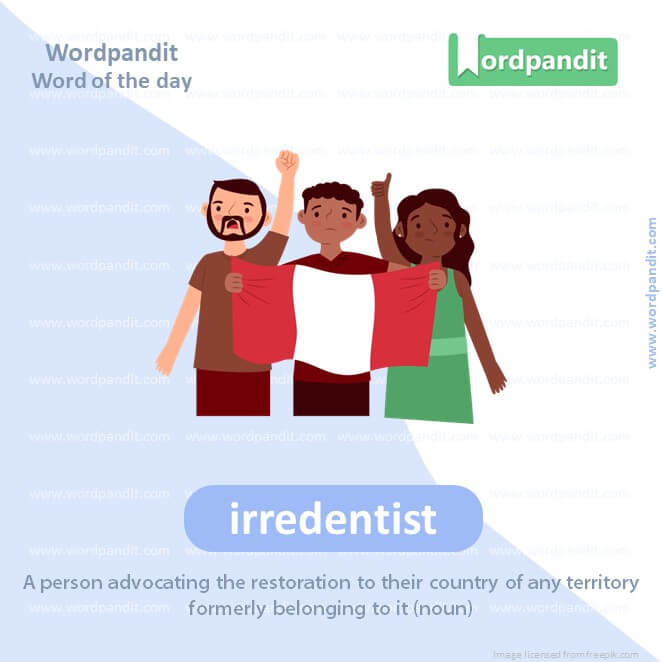
WORD-4: IRREDENTIST
CONTEXT: Israel and preserving the irredentist fantasy that someday their descendants will exercise what they believe is their “right of return,” effectively through the elimination of the Jewish state.
SOURCE: New York Times
EXPLANATORY PARAGRAPH: Imagine if someone wanted to take back a toy that used to belong to them but now belongs to someone else. An “irredentist” is like that person, but with countries. They believe that a piece of land that used to belong to their country should be returned, even if it now belongs to another country.
MEANING: A person advocating the restoration to their country of any territory formerly belonging to it (noun)
PRONUNCIATION: ih-ree-DEN-tist
SYNONYMS: Nationalist, revanchist, territorialist, annexationist, expansionist
USAGE EXAMPLES:
1. The irredentist movement aimed to reclaim the lost territories.
2. The politician was accused of promoting irredentist ideas in his speeches.
3. Historical disputes often fuel irredentist claims between neighboring countries.
4. Irredentist beliefs can lead to conflicts over borders and land.
WORD-5: DELEGITIMIZING
CONTEXT: They have been kept as perpetual refugees as a means of both delegitimizing.
SOURCE: New York Times
EXPLANATORY PARAGRAPH: Imagine if you built a sandcastle, and someone came over and said it wasn’t a real castle. They would be trying to make others believe your castle isn’t good or important. That’s what “delegitimizing” means—trying to make something seem less real, good, or important.
MEANING: The act of reducing or removing the legitimacy, credibility, or authority of something or someone (verb).
PRONUNCIATION: dee-lih-JIT-uh-my-zing
SYNONYMS: Undermining, discrediting, devaluing, disparaging, invalidating, belittling
USAGE EXAMPLES:
1. The campaign focused on delegitimizing the opponent’s achievements.
2. He was accused of delegitimizing the court’s decision with his comments.
3. By spreading false rumors, they aimed to delegitimize her reputation.
4. The critics’ harsh words worked to delegitimize the new policy.
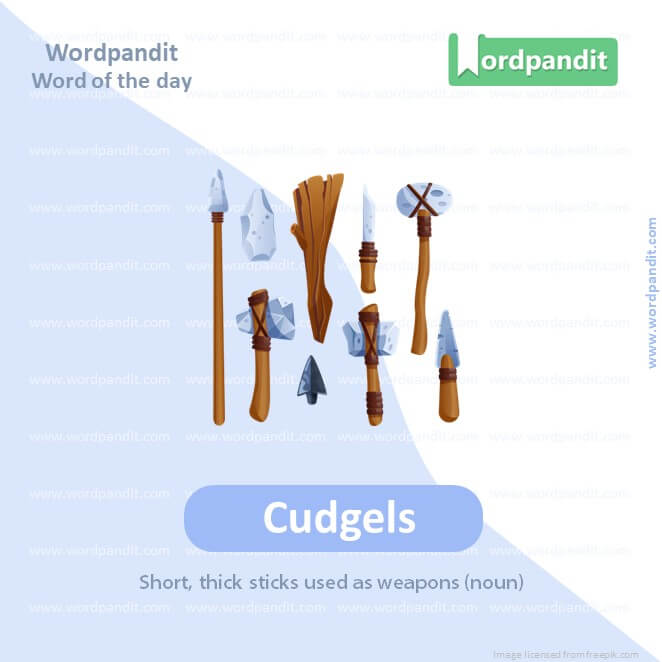
WORD-6: CUDGELS
CONTEXT: They should not be cudgels in a never-ending struggle, subsidized from one aggrieved generation to the next by international largess.
SOURCE: New York Times
EXPLANATORY PARAGRAPH: Imagine holding a big stick in your hand to protect yourself or to hit something. A “cudgel” is like that big stick. It’s something strong that you can use, often to fight or defend yourself.
MEANING: Short, thick sticks used as weapons (noun)
PRONUNCIATION: KUH-julz
SYNONYMS: Club, baton, bludgeon, stick, truncheon, mace
USAGE EXAMPLES:
1. The old man used a cudgel to protect himself from wild animals.
2. The warriors wielded cudgels in the battle.
3. She picked up a cudgel to defend her home.
4. The villagers armed themselves with cudgels against the invaders.
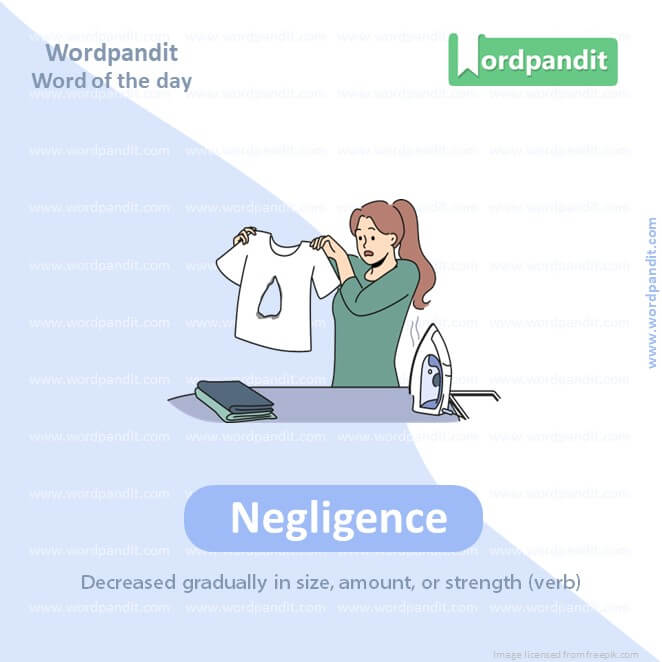
WORD-7: NEGLIGENCE
CONTEXT: Gross negligence or quiet complicity — they need to resign now.
SOURCE: New York Times
EXPLANATORY PARAGRAPH: Imagine if you had a plant that needed water every day, but you forgot to water it, and it started to wilt. Forgetting to take care of something important is called “negligence.” It’s when someone doesn’t do what they should, and something bad happens because of it.
MEANING: Decreased gradually in size, amount, or strength (verb)
PRONUNCIATION: NEG-li-jence
SYNONYMS: Carelessness, irresponsibility, oversight, inattention, neglect, disregard
USAGE EXAMPLES:
1. The fire was caused by the company’s negligence in maintaining safety standards.
2. His negligence led to the loss of important documents.
3. The hospital was sued for negligence after the patient was injured.
4. Negligence in driving can cause serious accidents.
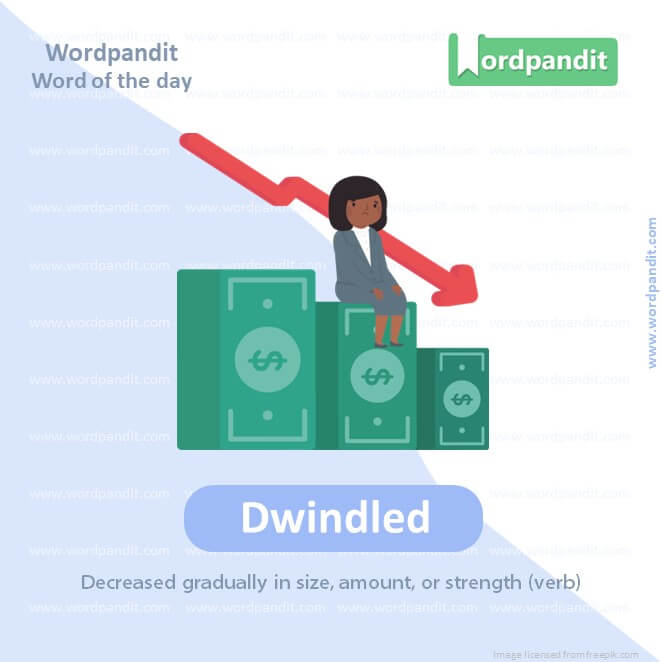
WORD-8: DWINDLED
CONTEXT: Ms. Haley’s hopes have now dwindled to a thin thread after her loss in New Hampshire.
SOURCE: New York Times
EXPLANATORY PARAGRAPH: Imagine if you had a big pile of candy, but every time you ate some, the pile got smaller and smaller. When something gets smaller or fewer in number, we say it “dwindles.” It’s when something slowly disappears or becomes less over time.
MEANING: Decreased gradually in size, amount. or strength (verb)
PRONUNCIATION: DWIN-duhld
SYNONYMS: Decreased, reduced, diminished, shrank, lessened, dwindled, withered
USAGE EXAMPLES:
1. The crowd dwindled as the rain started pouring down.
2. His savings dwindled after months of unemployment.
3. The water in the lake dwindled during the hot summer.
4. The team’s chances of winning dwindled as the game progressed.
WORD-9: INEXTRICABLY
CONTEXT: He has become the Republican establishment, and the party’s fate increasingly seems inextricably tied to his.
SOURCE: New York Times
EXPLANATORY PARAGRAPH: Imagine two friends who are always together, and you can’t think of one without the other. They are “inextricably” linked, meaning they are so connected that you can’t separate them.
MEANING: In a way that is impossible to separate or disentangle (adverb).
PRONUNCIATION: in-eks-TRIH-kuh-blee
SYNONYMS: Inseparably, closely, tightly, inevitably, intricately, unavoidably
USAGE EXAMPLES:
1. The history of the two countries is inextricably linked.
2. Their friendship was inextricably bound by shared experiences.
3. The problems were inextricably tied to poor management.
4. The success of the project is inextricably connected to teamwork.
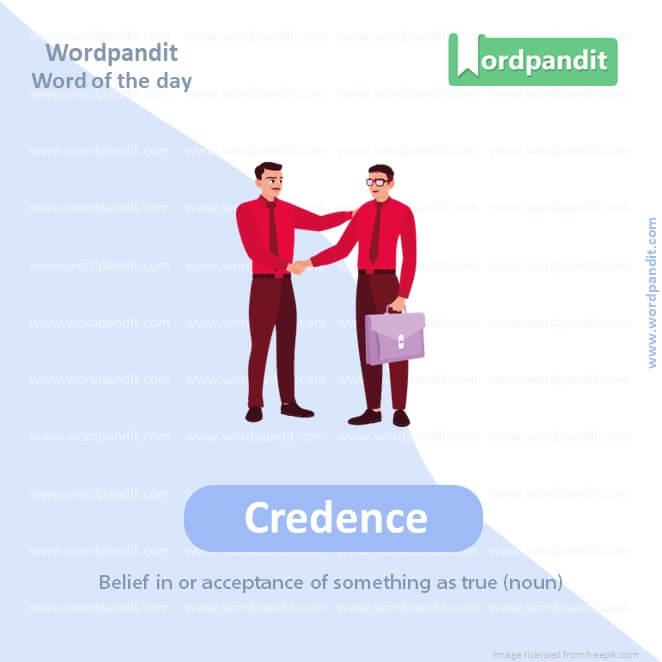
WORD-10: CREDENCE
CONTEXT: A large majority of the non-incumbent candidates whom Mr. Trump endorsed aligned themselves closely with his favored causes and gave credence to his conspiracy theories.
SOURCE: New York Times
EXPLANATORY PARAGRAPH: Imagine if someone told you a story, and you believed them because they always tell the truth. Giving “credence” means you believe what they say because it seems true and reliable.
MEANING: Belief in or acceptance of something as true (noun)
PRONUNCIATION: KREE-dence
SYNONYMS: Belief, trust, confidence, faith, acceptance, reliance
USAGE EXAMPLES:
1. His calm explanation gave credence to his story.
2. The evidence provided by the scientist lent credence to the theory.
3. She placed little credence in the rumors she heard.
4. The expert’s testimony added credence to the argument.
Vocabulary Grammar
The journey of language mastery is a thrilling blend of words and structure, often referred to as ‘vocabulary grammar’. These critical components of any language work hand in hand to facilitate meaningful communication. However, embracing ‘vocabulary grammar’ requires a nuanced understanding and a strategic learning approach.
The initial step towards understanding ‘vocabulary grammar’ is to study the functionality of words in a sentence. Grammar holds the key to how vocabulary is structured in language. Therefore, observe how words change or influence meaning when placed differently in a sentence.
Leveraging diverse resources is a great way to grasp ‘vocabulary grammar’. Engage with a range of reading materials, audio-visual resources, and interactive language apps. This offers genuine exposure to ‘vocabulary grammar’ in real-world contexts and enhances comprehensive learning.
While learning ‘vocabulary grammar’, it’s important to see vocabulary and grammar as interconnected. Understanding how different parts of speech function can help in the effective usage of vocabulary. Try creating your own sentences using new vocabulary following certain grammatical rules to reinforce learning.
Revision holds its due significance in mastering ‘vocabulary grammar’. Regular review of learnt grammar rules and vocabulary ensures long-term retention and bolsters understanding. Use techniques like spaced repetition to make your review sessions more effective.
Lastly, practicing ‘vocabulary grammar’ is key to cementing your knowledge. Whether it is through writing exercises or conversing in the language, practicing allows you to apply ‘vocabulary grammar’ in a practical context and aids in accurate language use.
In conclusion, understanding ‘vocabulary grammar’ calls for conscious observation, diversified resources, interconnected learning, regular revision, and relentless practice. As you navigate this path, you will see ‘vocabulary grammar’ like two sides of the same coin, both essential to the value it holds in the wealth of language learning.











